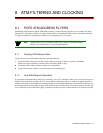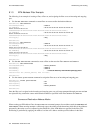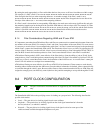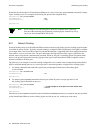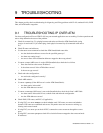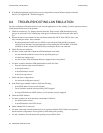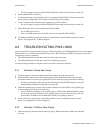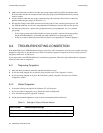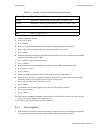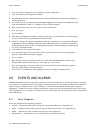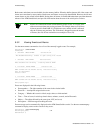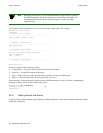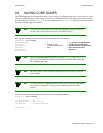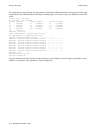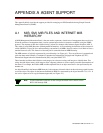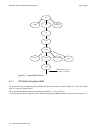
SmartSwitch ATM User Guide 9-5
Troubleshooting Troubleshooting Congestion
*Use the show portconfig command to view bandwidth utilization
3. Has the congestion subsided?
• If yes, you are done.
• If no, continue.
4. Have you changed the EPD threshold (set switchtrafficcongestion command)?
• If yes, replace it to the default setting. If congestion subsides, you are done.
• If no, continue.
5. Enter the show cacinfo and show portconfig commands for each port. Is the allocated bandwidth
small and is the traffic mostly UBR?
• If no, go back to step 4 and check next port.
• If yes, continue.
6. Enter the show porttrafficcongestion command. Is the UBR queue MaxValue large?
• If no, go back to step 4.
• If yes, continue.
7. Reduce the UBR queue MaxValue by a small amount, then wait a few minutes.
8. Enter the show portstats command, and take the default of all. Is the number of cells dropped
increasing for this port, and quickly decreasing for all other ports?
• If yes, proceed to the “Port Congestion” section.
• If no, continue.
9. Is the number of cells being dropped by all other ports decreasing somewhat?
• If no, go back to step 6.
• If yes, continue.
10. Enter the set caceqbwallocscheme command and set call admission control for this port to a more
conservative policy (
moderate or conservative).
11. Go back to step 4 until all ports have been checked.
9.4.3 Port Congestion
1. Enter the show portstats command a few times, noting the value for cells dropped and unknown
VCs dropped. Is the number of cells dropped equal to the number of VCs dropped?
rt-VBR Bandwidth* utilization less than 20%: Min = 16, Max = 1024
rt-VBR Bandwidth* utilization greater than 20%: Min = 128, Max = 4096
Nrt-VBR Min = 256, Max = 4096
UBR Min = 256, Max = 8192
ABR Min = 256, Max = 8192
Table 9-1 Settings for Class of Service Queues (Continued)
Service Class Recommended Settings



